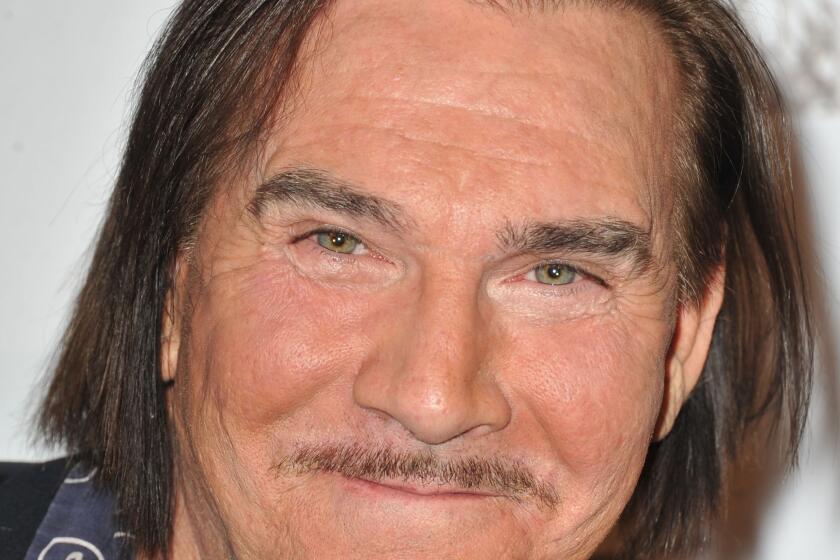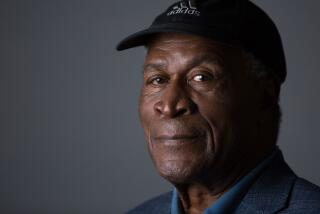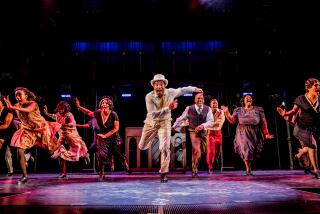‘Pee-wee’s Playhouse’ and ‘Elvira’ stars say John Paragon was so much more than Jambi
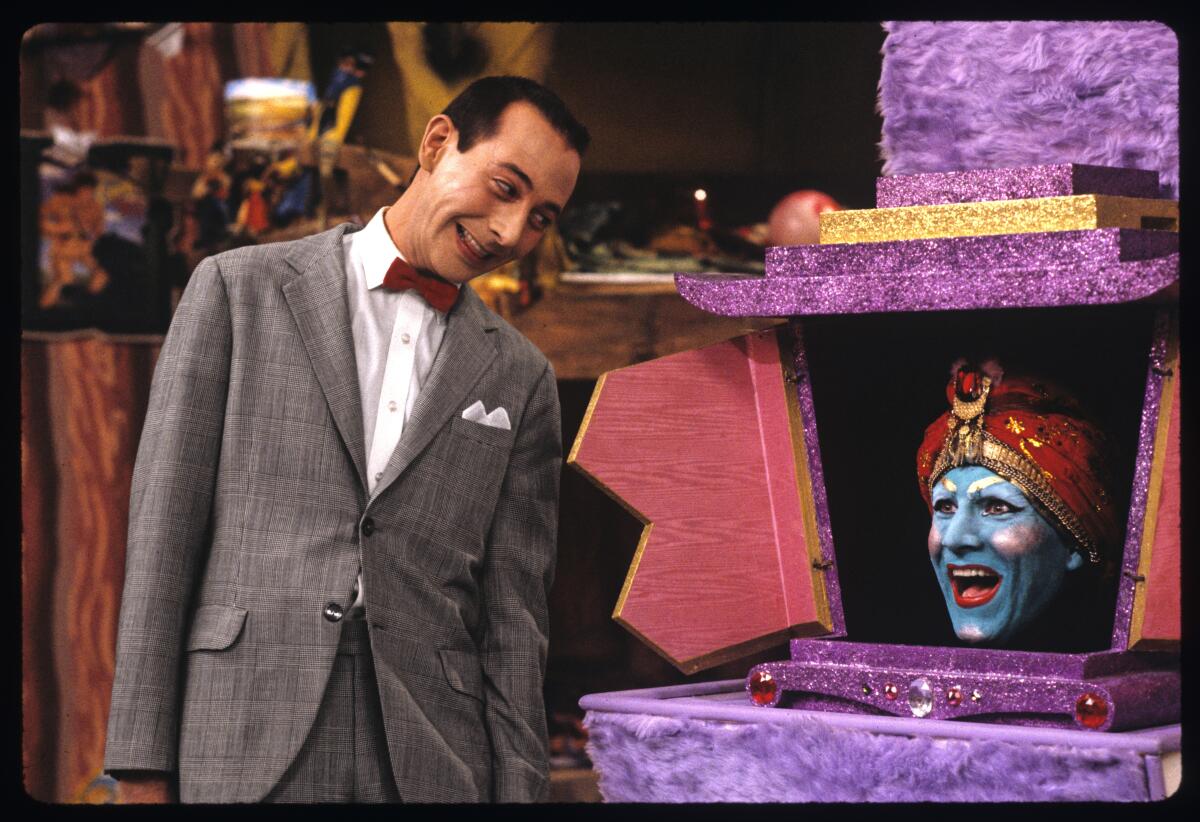
Donning a bright blue button-up with piano keys stitched on the back, actor John Paragon dove right into his 1983 special, “The Paragon of Comedy,” with a song: a frenzied montage about sex and aerobics that darted from jazz and reggae to rock, country and punk.
It wasn’t his idea. An alumni of the Groundlings, the legendary L.A. improv troupe, Paragon fished for theme and genre suggestions from the audience and ran with them — literally — zipping and hopping across the stage in a thrilling musical mash-up.
Paragon’s medley was a snapshot of his inspired performances in which he regularly did back-flips across the stage at the Groundlings Theatre in Los Angeles. Before making his name on television, he was a comedy star who burned brightly, especially for someone who would go on to spend much of his career behind the camera.
Most famous for his role as the wide-eyed, teal-faced Jambi the Genie on the children’s show “Pee-wee’s Playhouse,” Paragon was also a former gymnast, lifelong musician and talented artist, according to some of his closest collaborators.
Paragon died at age 66 on April 3 in Palm Springs, but his death was not publicized until earlier this month. He reportedly became reclusive later in life. The Riverside County Coroner’s Office attributed his death to heart disease compounded by “significant conditions” of chronic alcohol abuse.
The death of John Paragon, who played Jambi the Genie on ‘Pee-Wee’s Playhouse’ and helped create ‘Elvira: Mistress of the Dark,’ recently went public.
“There is no replacement for John,” Cassandra Peterson told The Times on Monday.
Peterson, who portrays the cult horror favorite Elvira, Mistress of the Dark, created the campy persona alongside Paragon. “Without John, I could tell you Elvira would never be the character that she came to be.”
The Times recently spoke to Peterson and Paul Reubens, who played Pee-wee Herman on “Pee-wee’s Playhouse,” about Paragon’s invaluable contributions to two of the most beloved pop-culture franchises of the 1980s and ‘90s.
“He was very charismatic, and his performing was very electrifying,” Reubens said of his late costar. “He was hard not to notice.”
Paragon’s spark caught the attention of both Reubens and Peterson when they first met the comedian during his run at the Groundlings. “He made you want to work with him,” Reubens said.
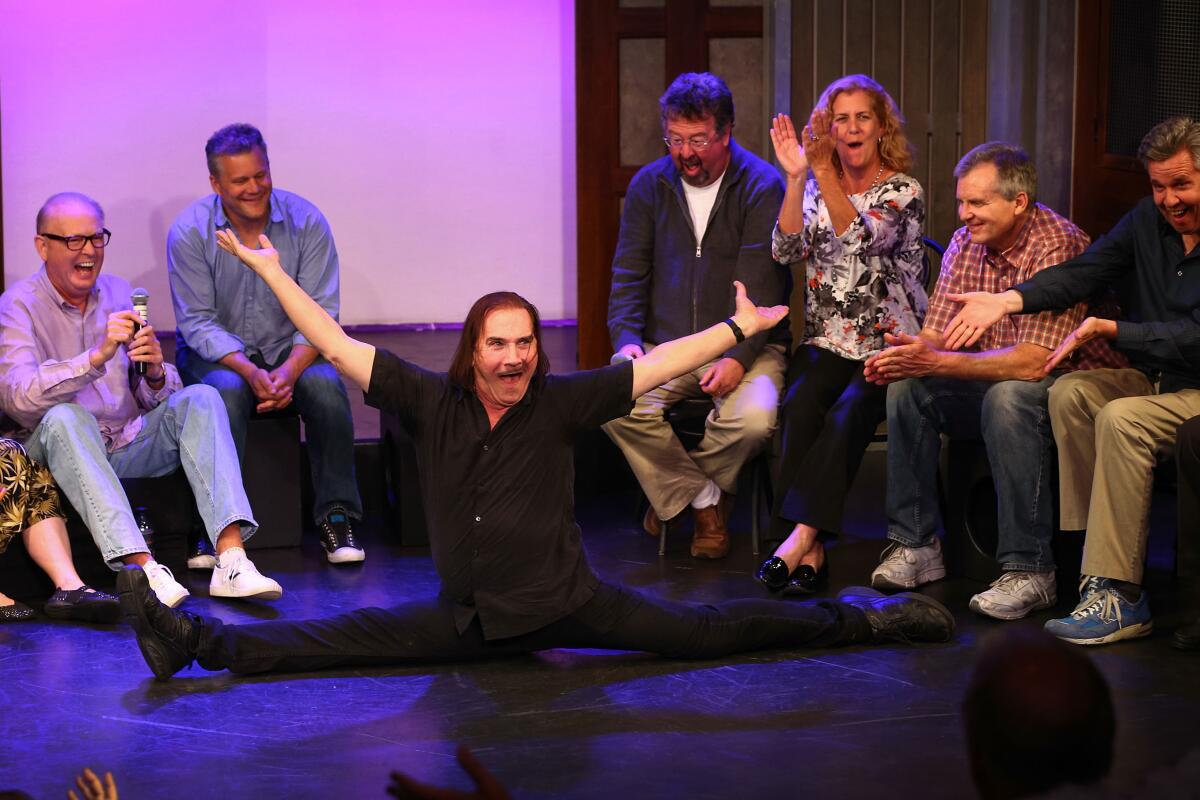
The future “Pee-wee” showrunner said Paragon had a “wickedness and a slyness and ... a naughty edge” to his humor. His deft use of innuendo also fit right into Elvira’s world, where, according to Peterson, he wrote many of the quotes her fans repeat to this day.
“I think he was the best one-liner joke writer of anyone in the world. ... They’re lines John came up with when we were writing — I mean, they’ve almost become colloquialisms in some ways,” Peterson said. Many of Elvira’s best quips — some of which aren’t suitable for print — were his creation.
Paragon’s barbed wit also shaped “Pee-wee’s Playhouse.” Reubens attests that the tone of his production didn’t change much from its run as a midnight show at the Roxy Theater to its Saturday morning television adaptation on CBS meant to entertain children. The two challenged themselves to write surface-level clean comedy for the kids with enough winks to entertain the adults.
In Sunday’s Calendar section, I wrote about the sparkling new reconstruction that is “Pee-Wee’s Playhouse: The Complete Series” (Shout Factory), which not only puts this crazy diamond of a series on to Blu-ray for the first time but has been assembled from the original 16mm film elements — something even the original series, put together on videotape, didn’t do.
Those sorts of jokes were Paragon’s forte. He penned Jambi’s famous phrase — “Mekka lekka hi, mekka hiney ho!” — that Reuben still finds funny today. “I sort of feel like when I hear that, I kinda turn into ‘Beavis and Butthead’ a little bit: ‘Ha ha, he said hiney.’”
Paragon’s mischievous streak also felt right at home with Peterson, who found a kindred spirit in Paragon after discovering they had similar childhood experiences. They both loved the Beatles and ran schemes as kids selling skillfully forged autographs of the band.
Their friendship blossomed into a 27-year creative partnership, during which the duo became inextricably linked. “I think he spent almost every night at my house having dinner,” Peterson said.
Creating Elvira’s sultry and sardonic horror-hostess character was a natural team effort, Peterson said. The two often found themselves on the same page, like when they penned young adult books about her character.
Cassandra Peterson, who plays horror icon Elvira, tells The Times about her newly announced auction and how she’ll celebrate Halloween in quarantine.
“Our Elvira voices in our head were so closely matched that I would write the first chapter, he would write the second. I’d write the third, he’d write the fourth. ... It was like our brains became one Elvira brain.”
After Pee-wee and Elvira, Paragon pursued a handful of other parts on-screen and off. But things were hardly the same after his creative heyday. He eventually moved from L.A. to Palm Springs, making it apparent that “he just ... didn’t want anything to do with anybody here,” Peterson said, adding that longtime colleagues and friends were worried when they weren’t able to reach him.
“Everybody who met him just loved him,” Peterson said. “He was unique, different, completely off the wall. And probably one of the funniest human beings on Earth.”
More to Read
The biggest entertainment stories
Get our big stories about Hollywood, film, television, music, arts, culture and more right in your inbox as soon as they publish.
You may occasionally receive promotional content from the Los Angeles Times.
